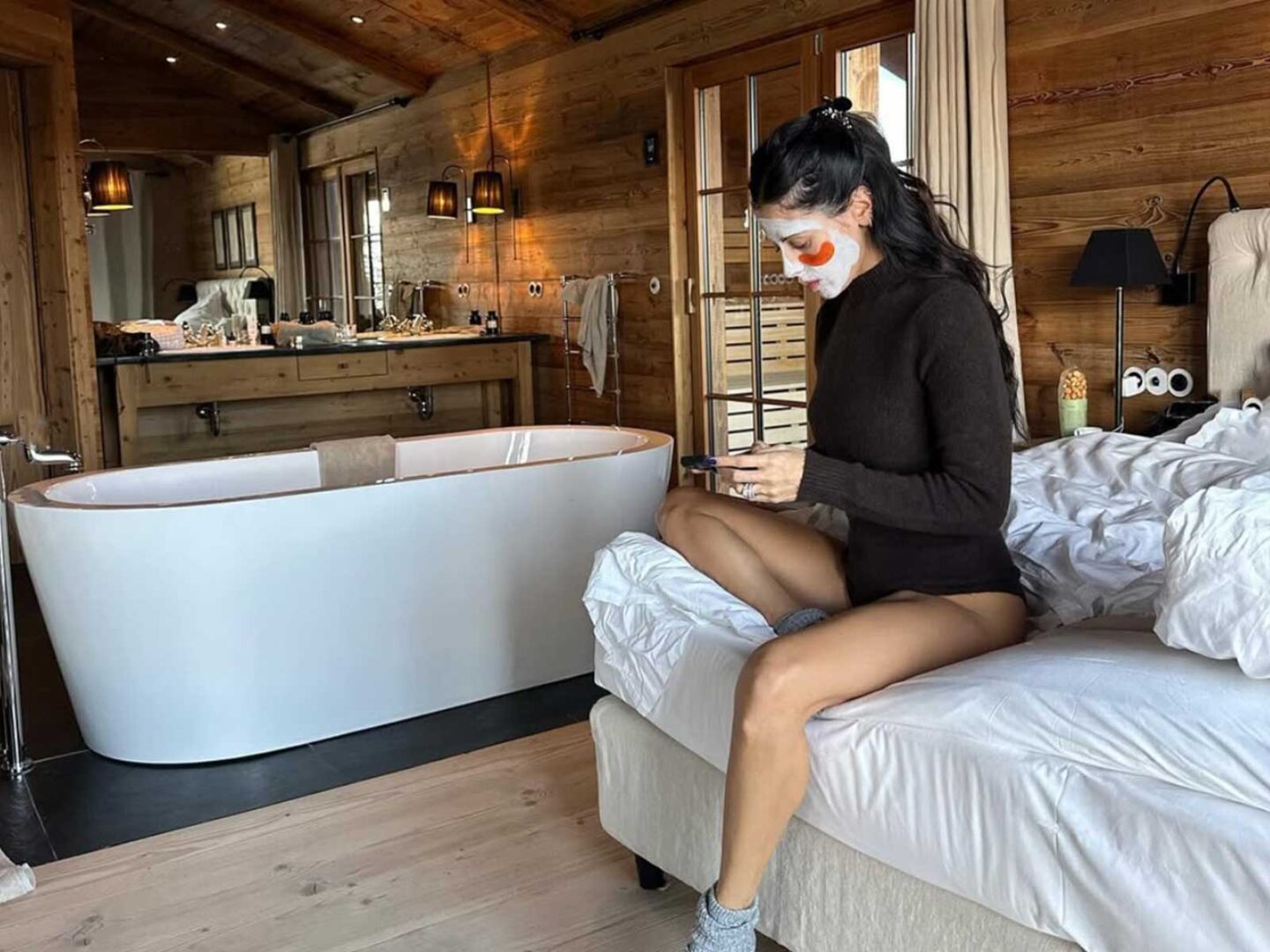On my phone screen, a woman is carefully peeling a piece of black tape from her lips. With almost ritualistic fluidity, she undoes her chin strap and begins removing the patches she’s worn overnight: one over her forehead, another just below her eyes. She releases a tangle of curls that slide out of a baby-pink silk bonnet, rubbing oil into her roots as she addresses her audience, announcing that she’s about to do her “everything shower.”
The ritual of skincare and self-care has become an act of liberation that has transcended the private to the viral, where the removal of layers of beauty is proclaimed as an almost transgressive performance. On TikTok, videos of this style accumulate millions of views: “the uglier you go to bed, the hotter you wake up.” In another video: “If he doesn’t love you with your mouth tape, your Korean sleeping mask, your side pillow, your toe separators and your silk cap, does he really love you?”
Looking at these images of women who go to bed wrapped in a cocktail of treatments and accessories, the question is inevitable: how, in the context of this universe of self-care, is there room for physical desire?
These women’s nighttime ritual becomes an almost unbreakable ceremony. With multiple skin products, mouth guards, and eye masks, devotion to this process becomes the center of their routines, and their sex lives are influenced by skincare. The beauty ritual becomes a non-negotiable priority, an act that ensures they don’t feel safe without it. This can significantly influence the sexual act. One person may not want to sleep with another because they don’t stop doing their routine, or if the other person sees them with all the products and accessories, they won’t want them.
While circumstances vary, beauty critic Jessica DeFino stresses that it’s not fair to reduce sexual connection to a matter of beauty rituals. “Sex exists beyond the cliché of ‘turn off the light and do it,’” says DeFino. “It’s simplistic to assume that those who follow a meticulous routine don’t have sex just because they cover their face with masks or seal their lips with duct tape. “Eroticism is not based on a predetermined appearance, but on a connection that transcends aesthetic conventions.”
On the other hand, sharing the complexity of this beauty process with one’s partner can become a form of vulnerability. But beyond the emotional nuances that this act may entail, a greater concern looms: an erotic emptiness that is becoming increasingly evident. No one seems to be sacrificing their routine time to stay closer to their partner. It’s a game of control, a deliberate resistance to the natural. We go to bed with our mouths taped shut, avoiding contact, avoiding even the possibility of losing ourselves in a hug, for fear that our unmade-up skin will be seen.
“Beauty culture keeps us constantly obsessed with our appearance,” DeFino says. “Sexual desire is distorted by this constant concern for image, and studies suggest that women who are distracted by their own reflection during sex experience less satisfaction and less intense orgasms.”
It is no coincidence that we are living through what we might call a sexual recession in an era where the cult of beauty is dragging us into pursuing ideals so far removed from the human. According to Dr. Justin Lehmiller of the Kinsey Institute’s report, Generation Z has sex only three times a month on average, and 37% have not had sex in the past month. The cause is obvious: aesthetics have become almost the antithesis of eroticism. What is sensual about “glazed donut skin” or the unattainable “clean girl aesthetic”?
Beauty culture has been designed for women (mostly) to prioritize appearance over eroticism, to project sexy before actually feeling sexy. DeFino sums it up clearly: “Beauty has always been about disciplining the female body, so that it stops being a body and becomes an object of consumption. Today, that discipline has morphed into a self-mechanization of the body: we seek to flatten all signs of life, such as wrinkles, pores, and fat, in the hope of achieving robotic perfection.”
But is this really a way to live? Maybe your skin is clearer if you don’t let anyone kiss your face; maybe your hair shines more if you spray it with argan oil before bed. And, certainly, society may be kinder to you if you fit the beauty standard imposed on you. Sure, conforming to such ideals brings with it certain socioeconomic benefits, and so it is almost impossible to resist the pressure. But, in the end, is this the price of perfection? Is social status more important than genuinely living, feeling, and connecting authentically?
Sigue toda la información de HIGHXTAR desde Facebook, Twitter o Instagram
